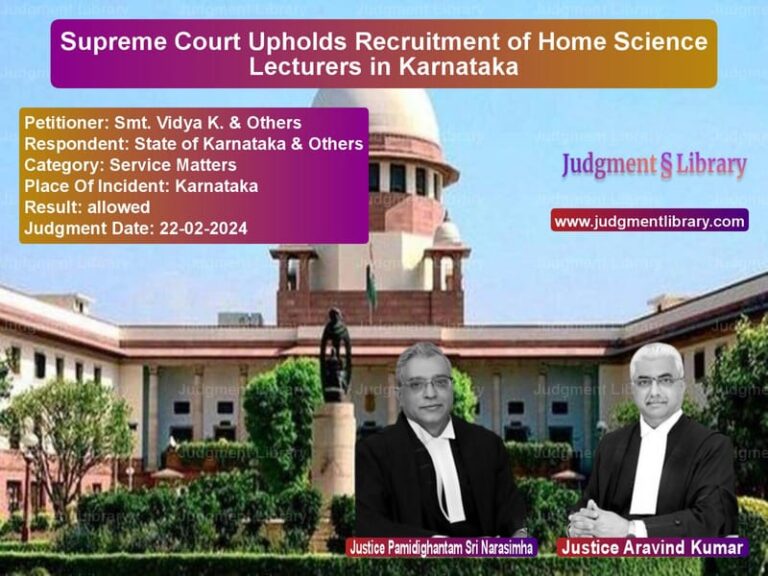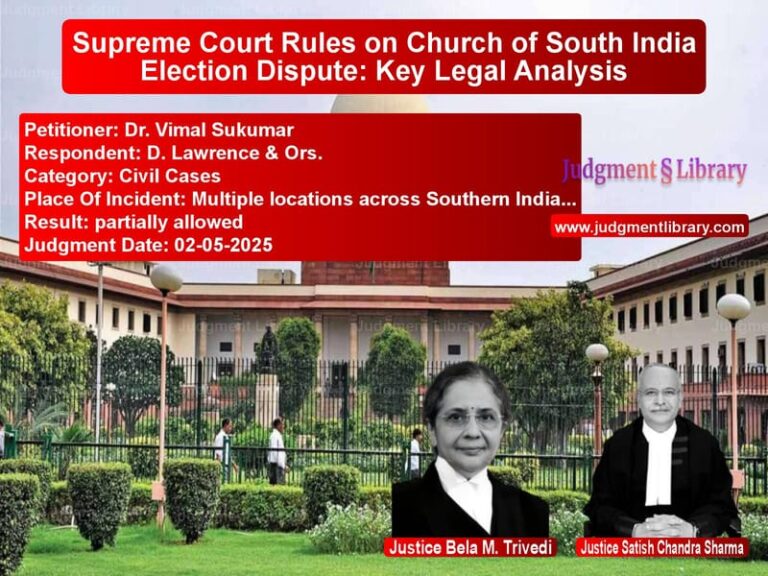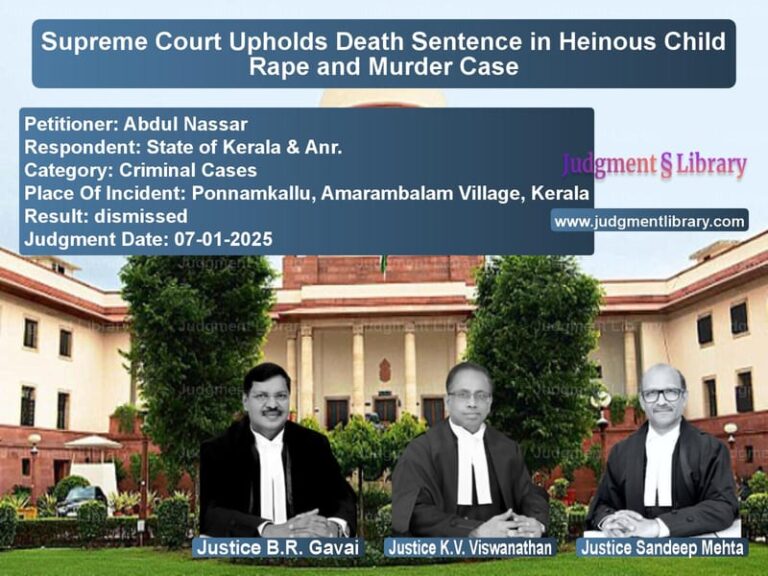Hydroelectric Power Agreement: Supreme Court Ruling on Transmission Line Delays and Compensation
The case of Indsil Hydro Power & Manganese Ltd v. State of Kerala & Ors. concerns a dispute between a private hydroelectric power company and the Kerala State Electricity Board (KSEB). The Supreme Court had to determine whether the delay in constructing transmission lines for a captive power project justified compensation and whether the government should reconsider its policy decisions regarding tariff concessions.
Background of the Case
In 1990, the State of Kerala issued a policy allowing private companies to construct and operate hydroelectric power plants. The policy set conditions for power generation, transmission, and agreements with KSEB. Under this framework, Indsil Hydro Power & Manganese Ltd was awarded a project to set up a hydroelectric plant at Kuthungal, Idukki District, Kerala, in 1992.
The agreement between Indsil and KSEB required the company to:
- Construct and operate the hydel power plant for 30 years.
- Use the generated power for captive consumption or sell it to KSEB.
- Bear the cost of constructing 4 km of transmission lines, while KSEB would construct the remaining transmission lines.
- Pay a specified tariff for power transmission, with a 12% deduction for wheeling charges.
Although Indsil completed the power plant in 2000, KSEB delayed constructing the transmission lines, preventing the plant from supplying power to the grid. Due to this delay, Indsil had to purchase power from KSEB at a higher tariff, leading to financial losses.
Indsil filed a writ petition before the Kerala High Court, seeking compensation for losses and an extension of tariff concessions. The High Court dismissed the petition, leading Indsil to appeal to the Supreme Court.
Petitioner’s Arguments
Indsil Hydro Power & Manganese Ltd argued that:
- KSEB’s failure to construct transmission lines within the agreed timeframe caused financial losses.
- The delay prevented Indsil from evacuating power and resulted in higher costs for purchasing electricity from KSEB.
- The State of Kerala should extend the concessional tariff to Indsil beyond 2000 due to the delay in transmission infrastructure.
- KSEB’s obligation to construct transmission lines within 30 months should be enforced.
Respondent’s Arguments
The State of Kerala and KSEB countered that:
- KSEB faced land acquisition issues and local protests, delaying the transmission line construction.
- The agreement did not specify a strict deadline for completing the transmission lines.
- Indsil had already benefited from concessional tariffs from 1994 to 2000 and was not entitled to further extensions.
- Since Indsil did not file a civil suit for damages, its claims for financial losses were invalid.
Supreme Court’s Observations
The Supreme Court examined the contractual obligations and found that:
- The agreement implicitly required KSEB to complete transmission lines within the 30-month project timeline.
- Indsil had completed its obligations, while KSEB’s delay prevented power evacuation.
- The State’s refusal to reconsider tariff concessions was based on outdated policy considerations.
- The High Court erred in dismissing Indsil’s claims without fully assessing KSEB’s role in the delay.
The Court stated:
“The sanctity of contracts must be maintained, and commercial agreements should be enforced fairly. The State cannot escape liability for delays that negatively impact private investors acting in good faith.”
Final Judgment
The Supreme Court allowed the appeal and directed the Kerala government and KSEB to:
- Re-evaluate Indsil’s request for compensation and tariff concessions within four months.
- Assess whether a financial remedy is warranted due to KSEB’s failure to construct the transmission lines on time.
- Ensure that similar future agreements include clear timelines and penalties for delays.
Impact of the Judgment
This ruling establishes important legal principles for power infrastructure projects:
- Delays in government obligations can justify compensation for private companies.
- Tariff concessions may be extended if contractual obligations are not met.
- Agreements between private companies and public utilities must have enforceable timelines.
- State agencies must ensure timely infrastructure development to support private investment.
Conclusion
The Supreme Court’s decision reinforces the principle that government authorities must fulfill their contractual obligations on time. By directing the Kerala government and KSEB to reconsider their stance, the ruling ensures that private investors in infrastructure projects receive fair treatment under the law. This judgment serves as a precedent for cases involving delays in government-supported infrastructure projects.
Petitioner Name: Indsil Hydro Power & Manganese Ltd.Respondent Name: State of Kerala & Ors..Judgment By: Justice D.Y. Chandrachud, Justice Indira Banerjee.Place Of Incident: Idukki, Kerala.Judgment Date: 30-07-2019.
Don’t miss out on the full details! Download the complete judgment in PDF format below and gain valuable insights instantly!
Download Judgment: Indsil Hydro Power & vs State of Kerala & Or Supreme Court of India Judgment Dated 30-07-2019.pdf
Direct Downlaod Judgment: Direct downlaod this Judgment
See all petitions in Contract Disputes
See all petitions in Company Law
See all petitions in unfair trade practices
See all petitions in Judgment by Dhananjaya Y Chandrachud
See all petitions in Judgment by Indira Banerjee
See all petitions in allowed
See all petitions in Remanded
See all petitions in supreme court of India judgments July 2019
See all petitions in 2019 judgments
See all posts in Corporate and Commercial Cases Category
See all allowed petitions in Corporate and Commercial Cases Category
See all Dismissed petitions in Corporate and Commercial Cases Category
See all partially allowed petitions in Corporate and Commercial Cases Category







